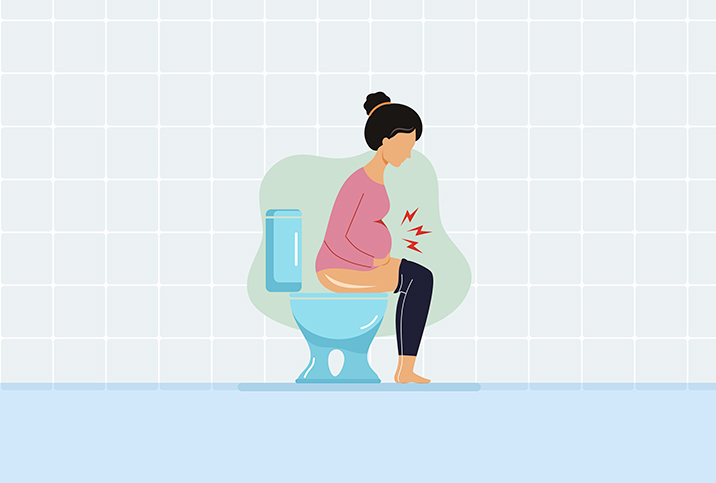Ultra-Processed Foods Can Affect Fetal Growth and Development

Pregnancy hormones can turn even the most health-conscious people on to fried Oreos and cheese dip. Cravings are par for the course, and the occasional pint of ice cream or plate of sausages and jam isn't likely to do any harm.
However, research suggests giving in to your hankerings too often could have consequences for you and your baby—at least, if you're consistently noshing on ultra-processed foods.
Ultra-processed foods, as defined by the NOVA food classification system, are made mostly or entirely from substances extracted from foods, derived from food constituents or synthesized in labs. They usually contain several added ingredients, including sugar, salt, starches, fats, artificial colors, emulsifiers, stabilizers or preservatives, according to Harvard Medical School.
Most of these foods are packaged, with examples including salty snacks, cold cuts, frozen meals, soft drinks and condiments.
Studies have shown an association between diets high in ultra-processed food and increased risks of pregnancy complications, such as gestational diabetes mellitus and preeclampsia, which can affect the pregnant parent and their unborn baby. New research suggests such a diet could also impact fetal and child health more directly, with potential implications ranging from allergies to neurodivergence.
4 ways an ultra-processed food diet can affect your baby
1. Childhood obesity
While weight does not necessarily indicate health, carrying excess fat may increase a person's likelihood of health conditions such as cardiovascular disease and diabetes.
Between 2017 and 2020, about 20 percent of children and teens in the United States were classified as obese, the Centers for Disease Control and Prevention (CDC) reported. Although several factors can contribute to obesity, genetics and the birthing parent's diet are thought to be involved.
Certain chemicals found in many ultra-processed foods can increase the amount of fat stored in the body by directly impacting fat cells and influencing the endocrine, metabolic and central nervous systems. When a pregnant parent consumes high amounts of these "obesogens," they not only increase their risk of obesity but their child's, too.
The effects of a parent's diet on a child's body composition persist beyond birth. An October 2022 study published in the BMJ found that when maternal parents consumed a diet high in ultra-processed foods during their children's early and adolescent years, the children were more likely to be obese, independent of other lifestyle factors on the part of the children or parents.
2. Reduced microbiome diversity
Diets high in ultra-processed foods can diminish diversity in the bodily microbiome, the vast assortment of microbes that populate various body parts, including the skin, gut and vagina. Different microbiota communities influence distinct body parts and systems, but together they impact everything from the immune system and metabolism to emotional well-being.
Dysbiosis and low microbial diversity have been linked to multiple ill effects, including obesity, type 2 diabetes, inflammatory bowel disease (IBD), cancer and neurological conditions such as depression.
"If a mother's eating a very ultra-processed diet and has a deficiency, a lack of diversity in the microbiome, that affects every organ system, every piece of her health, so the baby comes into the world with a less diverse microbiome," said Jill Carnahan, M.D., medical director of Flatiron Functional Medicine in Boulder, Colorado, in a phone interview.
Studies have shown that exposure to the vaginal microbiome during delivery (or vaginal seeding in case of a C-section) helps babies to develop a more diverse gut microbiome of their own, inoculating them against disease.
Carnahan noted healthy vaginal flora could also improve a baby's metabolic health and decrease their likelihood of being overweight and undernourished later in life, among other benefits.
3. Allergies
Allergic diseases are becoming more prevalent in developed and developing nations, according to the World Allergy Organization (WAO). These diseases occur when the immune system mistakes a benign substance, like pollen or peanuts, for a dangerous invader. Most of these allergies are an annoyance, with symptoms resembling a head cold, but they can be life-threatening. No one is born with allergies, but they usually arise in childhood, and factors such as genes are thought to increase the risk.
A pregnant parent's diet could contribute, too, according to a study published in the European Respiratory Journal. The study found pregnant people who ate the most added sugars, including high fructose corn syrup, sucrose and honey, were 38 percent more likely to have a child diagnosed with allergies between 7 and 9 years old. These children were also more likely to have allergic asthma.
Notably, the children's sugar consumption in early childhood didn't appear to have an impact.
4. Neurological development
A pregnant parent's ultra-processed diet can inhibit neurological development, according to a study published in October 2022 in Clinical Nutrition. The study included 2,377 mothers and their offspring and evaluated the parents' diets alongside their children's cognitive functioning. Researchers found children born to parents who ate a diet high in ultra-processed foods during pregnancy scored lower in verbal functioning.
Jordi Julvez Calvo, Ph.D., a neuropsychology and epidemiology researcher at Institut d'Investigació Sanitària Pere Virgili (IISPV) in Tarragona, Spain, was one of the study authors. He explained in a phone interview that the effects might occur because of the pro-inflammatory impact of ultra-processed foods, particularly those high in saturated fats, sugars and salt, and those containing neurotoxic, endocrine-disrupting particles such as bisphenols.
"All these in excess can create systemic inflammation and activate cellular oxidative stress," he said.
Systemic inflammation releases cascades of pro-inflammatory cytokines, which can infiltrate the placenta via the parent's bloodstream, Julvez Calvo explained. He and his colleagues hypothesize that these cytokines create systemic inflammation in the neural cells of the developing fetus's brain. This could inhibit the development of neurons and synaptic connections necessary for healthy cognitive function.
As for why language, and not other cognitive functions, was affected, Julvez Calvo said it could be due to dietary chemicals' effect on neurotransmitters. Different cognitive functions are located in distinct parts of the brain, he explained, and neurons specific to certain regions may be more vulnerable to systemic inflammation than others.
However, he said more research is needed.
Julvez Calvo's findings support a 2019 study published in Scientific Reports that found excessive levels of propionic acid (PPA) inhibited fetal neural development. These researchers suggest their findings could indicate a link between ultra-processed foods and autism spectrum disorder, since previous research has shown higher levels of PPA in stool samples of autistic children.
PPA occurs naturally in the digestive tract but is also used as a preservative and mold inhibitor in many processed foods. Researchers propose that consuming a diet high in ultra-processed foods could cause PPA levels to surge beyond healthy levels.
How to protect yourself and your baby
The best way to ensure a healthy pregnancy and a healthy baby is to cut out—or at least cut down on—ultra-processed foods.
"It's so core for the mother's and baby's health. It's absolutely essential. There's no workaround," Carnahan said, adding that eliminating ultra-processed foods is standard protocol for patients at her practice.
Besides mitigating potentially serious risks, minimizing ultra-processed foods and eating a balanced diet may assuage pregnancy-related symptoms such as heartburn and fatigue. If cutting out every ultra-processed product—and combating cravings—seems daunting, try the following:
- Make most meals at home.
- Prepare weekly meals on Sundays and freeze them rather than buying ready-to-heat frozen products.
- Buy frozen or canned fruits and vegetables if fresh ones are too expensive or inaccessible. Buying seasonal fruits and vegetables can cut costs, too.
- Reach for fruit when craving candy, cakes or ice cream.
- Exchange refined grains for whole grains.
- Prepare healthy snacks, such as chopped fruits and vegetables, homemade veggie chips or hard-boiled eggs, ahead of time.


















